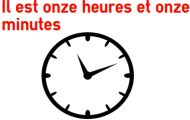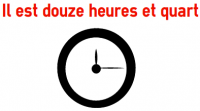Telling the time in French
Sign up for free to get all information about private lessons and our available group courses (A1, A2, B2, B2, C1, C2)
Sign up for freeSign up for free to get all information about private lessons and our available group courses (A1, A2, B2, B2, C1, C2)
Sign up for freeTelling the time is important for appointments, travelling, getting to work and many more things. If you already know the numbers then you already know half of the vocabulary used in this topic.
To begin with, you need to know that the word "time" has three different meanings in French; l'heure, le temps, le nombre de fois. Only l'heure is used in this case. The French "time" is equivalent to "o'clock" in English. In the table bellow you will find the essential vocabulary:
English | French |
|---|---|
| second | la seconde |
| minut | la minute |
| hour | l'heure |
| quarter of an hour | le quart d'heure |
| half an hour | la demi-heure |
| noon | le midi |
| midnight | minuit |
| night | la nuit |
| afternoon | l’après-midi |
| evening | la soirée |
| morning | le matin |
![]() Attention!
Attention!
Unlike in English "heure" is always required. For example in English you can say "It's almost five" or "She is going there at seven thirty." In French you must say "Il est presque cinq heures." and "Elle y arrivera à sept heures trente." Keep in mind that "heure" is noun and it's singular with "une" and plural with all other numbers.
Take online language lessons with a professional teacher
You can ask for the time in French "demander l'heure" in a few ways:
Quelle + heure + verbe être + il?
Examples
A quelle heure commence la pièce de théâtre? = At what time does the play begin?
Quand le magasin ouvre-t-il? = When does the store open?
Il est 7 heures vingt. = It's 7:20
![]() Attention!
Attention!
The only correct phrase for telling the time is "Il est" which is also impersonal, what means that "elle est 4 heures et demie" is incorrect.
In French time is based on the 24-hour clock, and the abbreviations p.m. or a.m are not used. Instead you can use the phrase "du matin" to mean a.m., l'après-midi from noon until 6 p.m., followed by "du soir" until midnight.
To tell a time on the hour in French, use "il e st + [number] + heure(s)".
st + [number] + heure(s)".
| 3:00 | il est trois heures |
|---|---|
| 9:00 | il est neuf heures |
| 6:00 | il est six heures |
For 30 minutes past the hour, it's used "et demie" (and a half) or "trente minutes" (and thirty minutes). 
| 1:30 | il est une heure et demie |
|---|---|
| 8:30 | il est huit heures et demie |
| 9:30 | il est neuf heures et trente minutes |
For 15 minutes past the hour in French is said "et quart" (and a quarter). If the clock shows the 45th minute you can use the word past = moins + le quart, instead of 45 minutes.
| 4:45 | il est cinq heures moins le quart |
|---|---|
| 4:15 | il est quatre heures et quinze minutes |
| 1:45 | il est deux heures moins le quart |
| 1:15 | il est une heure et quart il est une heure et quinze minutes |
To say 1 to 30 minutes past the hour, simply you say the number of minutes after the hour. The only difference can be for 31 to 59 minutes past the hour, where you can say the next hour "moins" (minus) the number of minutes left. See the examples below! 
| 4:09 | il est quatre heures et neuf minutes |
|---|---|
| 14:20 | il est quatorze heures et vingt minutes |
| 19:40 | il est vingt heures moins vingts il est dix-neuf heures et quarante minutes |
![]() Now to practice you time-telling skills, we suggest you to try out our exercises!
Now to practice you time-telling skills, we suggest you to try out our exercises!